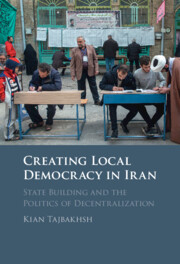Book contents
- Creating Local Democracy in Iran
- Creating Local Democracy in Iran
- Copyright page
- Contents
- Figures
- Tables
- Preface: Stumbling on Local Democracy (My Personal Journey)
- Acknowledgments
- Overview of the Book
- Abbreviations
- Part I Launching Local Democracy
- Part II Arguing for Local Democracy
- Part III Blocking Local Democracy
- 6 The Rocky Path from Elections to Democracy
- 7 City Planning and the Challenges of Democratic Governance
- 8 Financing Local Democracy
- 9 Geopolitics and the Limits of International Municipal Cooperation
- 10 What of the Future of Local Democracy?
- Index
7 - City Planning and the Challenges of Democratic Governance
from Part III - Blocking Local Democracy
Published online by Cambridge University Press: 07 July 2022
- Creating Local Democracy in Iran
- Creating Local Democracy in Iran
- Copyright page
- Contents
- Figures
- Tables
- Preface: Stumbling on Local Democracy (My Personal Journey)
- Acknowledgments
- Overview of the Book
- Abbreviations
- Part I Launching Local Democracy
- Part II Arguing for Local Democracy
- Part III Blocking Local Democracy
- 6 The Rocky Path from Elections to Democracy
- 7 City Planning and the Challenges of Democratic Governance
- 8 Financing Local Democracy
- 9 Geopolitics and the Limits of International Municipal Cooperation
- 10 What of the Future of Local Democracy?
- Index
Summary
Control over the management of urban land use is one the local government powers with the greatest influence on the lives of residents (the other being the budget). Yet in Iran, despite political decentralization, the responsibility for land use rests with the central government and the relevant local branches of the relevant ministries. Chapter 7 reviews the history and legal framework of master planning as well as the economic pressures that led governments to ignore their municipalities’ master plans during the 1990s. The chapter describes how a controversial urban renewal project in the early 1990s led to calls for greater local participation in the development and design of plans by the new elected council. It then examines the effort to give the municipality a greater and indeed determinative role in city planning and land use management during the preparation of the third Tehran Master Plan 2003–2007. A success in the capital city would have created a precedent and model for many other cities. While national media brought the issue to public attention and local representatives had unprecedented involvement in city planning, ultimately the city council failed to achieved more than an informal role with formal responsibility remaining with the central government. The chapter concludes by highlighting the great difficulties and challenges of achieving greater local participation in complex and technical areas of local governance such as land use planning.
Keywords
- Type
- Chapter
- Information
- Creating Local Democracy in IranState Building and the Politics of Decentralization, pp. 184 - 212Publisher: Cambridge University PressPrint publication year: 2022

